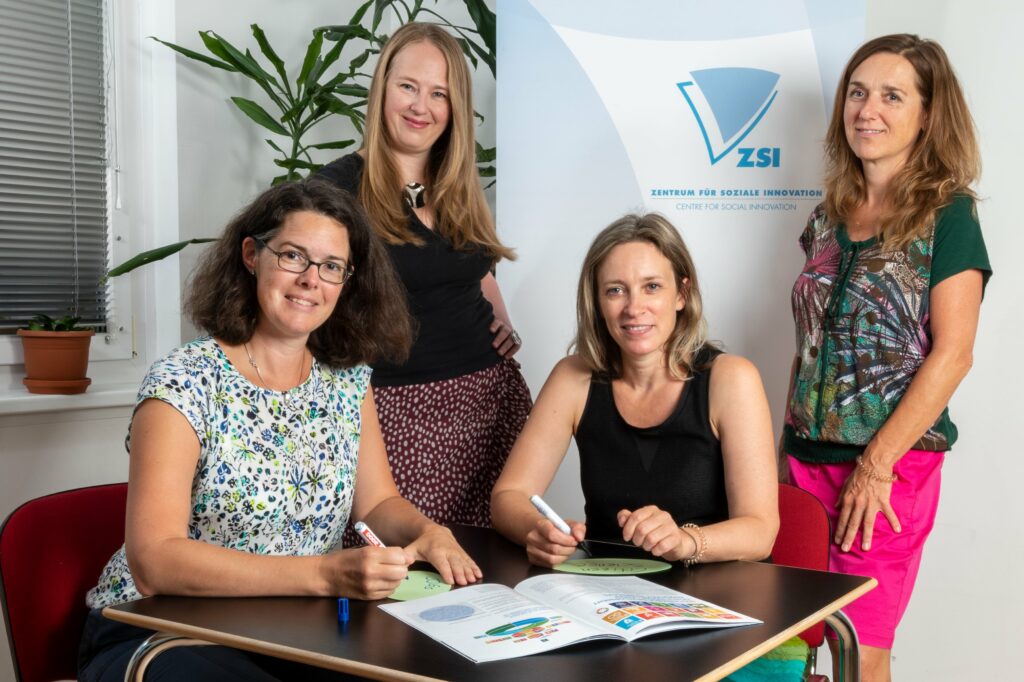Meet the StepChange team working on one of our Citizen Science projects ...
27. Sep. 2021
The StepChange project brings together 10 partners implementing 5 citizen science initiatives in the areas of health, energy and environment, supported with mutual learning, training and participative evaluation ...

Register for the next edition here: https://stepchangeproject.eu/media-centre/newsletter/
The first newsletter of the project answered questions such as:
- What is the added value of stakeholder engagement in citizen science
- What are our plans to ensure includiveness and diversity
- Who are our partners
- Key updates from the project.
The ZSI-Team also provided a short contribution - which you can read here:
CENTRE FOR SOCIAL INNOVATION, AUSTRIA
What do you expect from your participation in STEP CHANGE?
In STEP CHANGE the main role of the Centre for Social Innovation (ZSI) is to organise the training and mutual learning among the citizen science initiatives. This allows us to be one of the partners really looking into this variety of cases, while identifying the multiple “knowledges” and supporting the team members in the creation and exchange of know-how. We want to come out of this journey through STEP CHANGE with the feeling that everyone learnt something and that together we contributed to shaping new knowledge. We hope to be able to design smooth and fun exchanges, which remain focused on addressing the research questions. ZSI was founded in 1990 and we continuously learn what makes innovations socially relevant, how the research system changes and how more and more actors can become relevant partners on the pathways to impactful research. Citizen science is an important stepping-stone in making the research and innovation (R&I) system responsive, inclusive, reflective, open and transparent. We expect to contribute with our know-how to this overall objective.
Could you mention a successful project directly involving citizens that you had the chance to lead/participate in? What have been the keys of its success?
We could mention here a series of focused projects in which ZSI is or was actively involved, such as Co-Act, which is about co-designing citizen social science for collective action, the European Citizen Science Platform, or CAPTOR, the “Collective Awareness Platform for Tropospheric Ozone Pollution”. Applying expertise in a given field, such as evaluation and impact assessment, or improving the participation to citizen science of particular stakeholder groups such as marginalised youth, can be very exciting and rewarding. However, in fact, the most pleasure comes from taking part in the process as a citizen, as we all are. We might be experts in one scientific domain or in inter- and trans-disciplinary cooperation, but there is nothing like learning and understanding together with others something new that really hits home and meets your needs and interests. Own health issues or pressing societal matters such as air pollution, for example, provide an excellent motivator and driver. Fun and ease of use of the concrete application that is used to contribute to the CS initiative are of course also key.
Think about Citizen Science and choose a traditional Austrian recipe. What would it be and why?
How about some Knödel (dumplings)? They can surprise you like a CSI project, as you don’t immediately see what is inside – apricots, plums, strawberries or chocolate or maybe speck or other savoury options. A real Austrian soul food are the “Marillenknödel”. Actually, these are themselves relevant for a citizen science project on linguistics (implemented by the University of Vienna) which aims to discover the origins of specific Austrian words or for example to find different ways to pronounce the word “Marün” (Marille, apricot in Austrian dialect).
Related Articles:















































